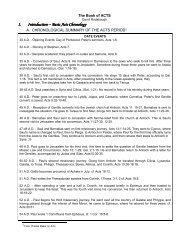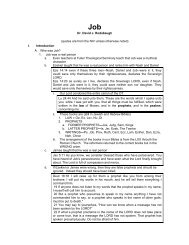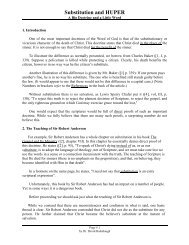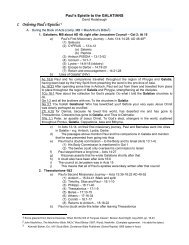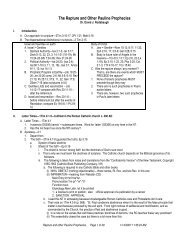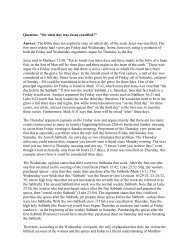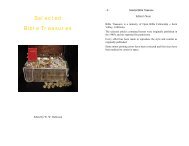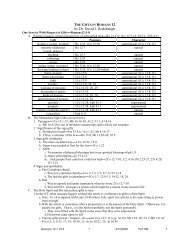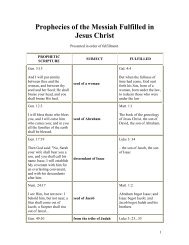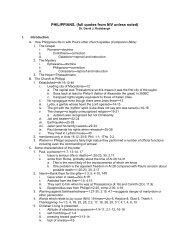The Forgotten Doctrine of Separation - Hope of the Glory
The Forgotten Doctrine of Separation - Hope of the Glory
The Forgotten Doctrine of Separation - Hope of the Glory
Create successful ePaper yourself
Turn your PDF publications into a flip-book with our unique Google optimized e-Paper software.
<strong>The</strong> <strong>Forgotten</strong> <strong>Doctrine</strong> <strong>of</strong> <strong>Separation</strong><br />
By Dr. David J. Rodabaugh<br />
One <strong>of</strong> <strong>the</strong> most important doctrines in <strong>the</strong> Word <strong>of</strong> God is <strong>the</strong> doctrine <strong>of</strong><br />
separation. It is also one <strong>of</strong> <strong>the</strong> most controversial.<br />
This key doctrine is once again being shunned by leaders who call<br />
<strong>the</strong>mselves fundamentalists.<br />
Some years ago, this doctrine was one <strong>of</strong> <strong>the</strong> basic differences between<br />
those called "fundamentalists" and those called "neo-evangelicals"<br />
For example, in his book, <strong>The</strong> New Evangelicals (1963, Zondervan), Ronald<br />
Nash listed what he called "extreme separation" as one <strong>of</strong> <strong>the</strong> four basic tenets<br />
<strong>of</strong> fundamentalism.<br />
This issue was foremost in <strong>the</strong> refusal by some believers to support <strong>the</strong> Billy<br />
Graham crusades. In fact, an entire book, Cooperative Evangelism (1958), was<br />
written by Robert O. Ferm as a defense <strong>of</strong> Billy Graham's crusade techniques.<br />
In <strong>the</strong> foreward to this book, Stephen Paine wrote, "<strong>The</strong> willingness <strong>of</strong> Billy<br />
Graham to seek <strong>the</strong> cooperation <strong>of</strong> liberal churches draws against him <strong>the</strong><br />
persistent and unreserved opposition <strong>of</strong> separatists".<br />
While we disagree totally with Robert Ferm's position, we confess that he<br />
states it clearly. On page 13, he says that <strong>the</strong> great question is, "With whom shall<br />
we evangelize," He fur<strong>the</strong>r claims that <strong>the</strong> issue is that <strong>of</strong> cooperation.<br />
On page 19, Robert Ferm lists four basic criticisms <strong>of</strong> Billy Graham:<br />
1. Billy Graham accepts sponsorship <strong>of</strong> liberals, etc..<br />
2. This confuses young converts.<br />
3. New converts may be counseled by those from liberal churches.<br />
4. New converts may be referred to liberal churches.<br />
<strong>Separation</strong> More Than Just Evangelism.<br />
<strong>The</strong> issues <strong>of</strong> separation and cooperation affect more than just evangelism.
<strong>The</strong>y are <strong>the</strong> very basis <strong>of</strong> <strong>the</strong> organization <strong>of</strong> <strong>the</strong> local church.<br />
<strong>The</strong> scripture clearly teaches that <strong>the</strong>re must not be unnecessary splits in<br />
<strong>the</strong> Body <strong>of</strong> Christ. To start a new church over personalities or side issues is<br />
totally contrary to <strong>the</strong> Word <strong>of</strong> God. It is not to be tolerated.<br />
Let us look carefully at <strong>the</strong> Word <strong>of</strong> God on this issue. As we do, we should<br />
ask if <strong>the</strong>re is a different basis for cooperation in evangelism than <strong>the</strong>re is in<br />
Bible teaching. If <strong>the</strong>re isn't, <strong>the</strong>n we must be careful to apply <strong>the</strong> same<br />
principles to both situations.<br />
Some years ago at a Pastors' conference, a 'grace' pastor was thrilled<br />
because some six churches in his town had held evangelistic services toge<strong>the</strong>r.<br />
<strong>The</strong>y had a 'grace' man as <strong>the</strong> preacher <strong>the</strong> first year. Unfortunately, I asked <strong>the</strong><br />
question, "What are you going to do next year when it is <strong>the</strong> .., church's turn to<br />
supply <strong>the</strong> preacher?" <strong>The</strong>re was silence. You see <strong>the</strong> ... church taught that you<br />
have to be baptized to be saved.<br />
<strong>The</strong> subject is basic -- and ignored. Today, some groups who were clear<br />
and fundamentalist on <strong>the</strong> issue 15 years ago are shunning it today.<br />
Church history, like <strong>the</strong> history <strong>of</strong> Israel, is <strong>of</strong>ten a record <strong>of</strong> doctrinal and<br />
practical compromise. It is rarely a record <strong>of</strong> faithfulness to <strong>the</strong> Word <strong>of</strong> God.<br />
<strong>Separation</strong> Defined.<br />
A simple short definition <strong>of</strong> <strong>the</strong> doctrine is that separation is separation from<br />
whatever is contrary to <strong>the</strong> mind <strong>of</strong> God unto God himself. This definition is so<br />
broad that it virtually includes every facet <strong>of</strong> <strong>the</strong> Christian life. Certainly no one<br />
can quarrel with such a definition. <strong>The</strong> quarrels begin when we start to look at<br />
just what implications <strong>the</strong>re are from this.<br />
<strong>Separation</strong> and Personal Holiness.<br />
In its broadest definition, separation certainly includes any call to leave sin<br />
and live for <strong>the</strong> Lord. We should <strong>of</strong>ten reflect on Ro 12:1, 2 where we are<br />
commanded to present our bodies a living sacrifice, holy acceptable unto God.
Paul fur<strong>the</strong>r states, "And be not conformed to this world but be ye transformed by<br />
<strong>the</strong> renewing <strong>of</strong> your mind, that ye may prove (test) what is that good,<br />
acceptable, and perfect, will <strong>of</strong> God."<br />
<strong>The</strong>re is certainly both a negative and a positive aspect to personal holiness.<br />
We are not to be conformed to this world (age) and we are to be transformed. In<br />
2 Tim 2:19 we read, "And, Let every one that nameth <strong>the</strong> name <strong>of</strong> Christ depart<br />
from iniquity"<br />
<strong>The</strong> call to forsake sinning extends even to our words. In Eph 5:2-5 <strong>the</strong><br />
commands to forsake fornication, uncleanness and covetousness are extended<br />
to include <strong>the</strong> forsaking <strong>of</strong> filthiness, foolish talking and jesting <strong>The</strong>re are many<br />
who seem almost boastful <strong>of</strong> <strong>the</strong>ir outward lives but <strong>the</strong>ir speech betrays a most<br />
unholy life.<br />
In addition, <strong>the</strong> call to personal holiness calls for <strong>the</strong> saint to (Eph 5:11), "...<br />
have no fellowship with <strong>the</strong> unfruitful works <strong>of</strong> darkness, but ra<strong>the</strong>r reprove<br />
<strong>the</strong>m." <strong>The</strong> believer is in no way to be identified with sin.<br />
In addition, holiness has its call to dedication to <strong>the</strong> Lord. It is not..enough<br />
to refrain from sinning -- we must live for <strong>the</strong> Lord as well.<br />
In Phil 3:10, we read, "That I may know him, and <strong>the</strong> power <strong>of</strong> his<br />
resurrection, and <strong>the</strong> fellowship <strong>of</strong> his suffering, being made conformable to his<br />
death"<br />
What an important concept -- we can experience his power in holy living by<br />
being conformable to his death. <strong>The</strong>re can be nothing <strong>of</strong> self in that. <strong>The</strong>re can<br />
be no insistence in our way in that. <strong>The</strong>re can only be simple subjection to <strong>the</strong><br />
revealed will <strong>of</strong> a sovereign God. <strong>The</strong> reader should also read Phlp 2:5-8.<br />
As we have seen, <strong>the</strong>re is both a positive and a negative aspect to<br />
personal holiness. To have one without <strong>the</strong> o<strong>the</strong>r is to live an unholy life.<br />
<strong>Separation</strong> and Fellowship<br />
Like so many doctrines, careful understanding begins with careful<br />
definition. In this case, it will also be helpful to define <strong>the</strong> opposite doctrine.<br />
It really is not so surprising that to define an idea, you need <strong>the</strong> definition <strong>of</strong> <strong>the</strong><br />
contrary notion.
In this case, <strong>the</strong> opposite notion is that <strong>of</strong> fellowship. To talk <strong>of</strong> those from<br />
whom you must separate is simply <strong>the</strong> o<strong>the</strong>r side <strong>of</strong> <strong>the</strong> issue <strong>of</strong> with whom you<br />
must fellowship.<br />
<strong>The</strong> word fellowship is about as misunderstood as is <strong>the</strong> word separation.<br />
<strong>The</strong>re are two meanings commonly associated with fellowships<br />
1. a social get toge<strong>the</strong>r.<br />
2. visiting with someone else about spiritual matters.<br />
Nei<strong>the</strong>r <strong>of</strong> <strong>the</strong>se uses fits <strong>the</strong> meaning <strong>of</strong> <strong>the</strong> word fellowship when we find it in<br />
<strong>the</strong> scriptures. <strong>The</strong> word "fellowship' is a translation <strong>of</strong> two Greek words--<br />
koinwnia and metoch. Each <strong>of</strong> <strong>the</strong>se words has <strong>the</strong> thought <strong>of</strong><br />
fellowship, communion, sharing in common.<br />
It is instructive to note that <strong>the</strong> related nouns koinwnos and<br />
metocos are used in Luke 5 in a synonomous fashion. In Lk 5:7, <strong>the</strong> word<br />
metocos is used <strong>of</strong> men who were in a business (that <strong>of</strong> fishing)<br />
partnership. <strong>The</strong>y are called partners. In verse 10, we find that <strong>the</strong>se men were<br />
called partners again only this time <strong>the</strong> Greek word is koinwnos. Hence,<br />
<strong>the</strong>se two words denote partners.<br />
Thus <strong>the</strong> meaning behind <strong>the</strong> words for fellowship is partnership. In<br />
particular, a business partnership. This is a far cry from a social or a time <strong>of</strong><br />
informal conversation.<br />
Now, separation is <strong>the</strong> opposite <strong>of</strong> partnership (fellowship).<br />
Given a particular person, I must ei<strong>the</strong>r fellowship with him or I must separate<br />
from him. <strong>The</strong>re is no o<strong>the</strong>r option. If I can't fellowship, <strong>the</strong>n I must separate.<br />
<strong>The</strong> same thing can be said about an organization Given a particular<br />
organization, I must ei<strong>the</strong>r fellowship with it or I must separate from it. <strong>The</strong>re is<br />
no o<strong>the</strong>r option.<br />
Every believer fellowships with some and separates from <strong>the</strong> o<strong>the</strong>rs.<br />
Unfortunately, <strong>the</strong>se attachments and separations are usually based on emotions<br />
and personal considerations ra<strong>the</strong>r than on <strong>the</strong> Word <strong>of</strong> God.<br />
<strong>Separation</strong> from <strong>the</strong> Unsaved Commanded.
"Blessed is <strong>the</strong> man that walketh not in <strong>the</strong> counsel <strong>of</strong> <strong>the</strong> ungodly, nor<br />
standeth in <strong>the</strong> way <strong>of</strong> sinners, nor sitteth in <strong>the</strong> seat <strong>of</strong> <strong>the</strong> scornful." (Ps<br />
1:1)<br />
Yes, happy is that man that does not place himself in <strong>the</strong> company <strong>of</strong><br />
sinners. He is <strong>the</strong> one that puts a distance in some way between himself and <strong>the</strong><br />
world. He is <strong>the</strong> one who is separate from <strong>the</strong> world.<br />
<strong>The</strong> obedient believer is one who is not in fellowship with those who are<br />
outside <strong>of</strong> Christ. This does not mean that he has no contact with <strong>the</strong> unsaved.<br />
Indeed, we are commanded repeatedly to witness to <strong>the</strong> saved. We have been (1<br />
Th. 2:4) put in trust with <strong>the</strong> gospel. We are to take to <strong>the</strong> unsaved <strong>the</strong> message<br />
that commands <strong>the</strong>m to be reconciled to God (2 Cor 5:18-20) At no time should<br />
<strong>the</strong> believer take <strong>the</strong> postion that he is not to contact <strong>the</strong> unbeliever.<br />
But, <strong>the</strong> believer is definitely not to become involved with <strong>the</strong> unsaved. We are<br />
taught that (1 Cor 15:33), "evil communications corrupt good manners." <strong>The</strong> King<br />
James in this verse is not quite <strong>the</strong> way we would say it. It literally means that,<br />
"bad associations corrupt good customs," We are commanded to be in contact<br />
with <strong>the</strong> unsaved, but we are forbidden to form associations with <strong>the</strong> unsaved.<br />
My dear Christian friend, if one <strong>of</strong> your best friends is an unbeliever <strong>the</strong>n you<br />
are in serious danger -- that close friend <strong>of</strong> yours in nothing but trouble for you in<br />
your Christian life.<br />
In 2 Cor 6:17-7:1 (NIV), we read, "Do not be yoked toge<strong>the</strong>r with unbelievers,<br />
For what do righteousness and wickedness have in common? Or what fellowship<br />
can light have with darkness' What harmony is <strong>the</strong>re between Christ and Belial?<br />
What does a believer have in common with an unbeliever? What agreement is<br />
<strong>the</strong>re between <strong>the</strong> temple <strong>of</strong> God and idols? For we are <strong>the</strong> temple <strong>of</strong> <strong>the</strong> living<br />
God, As God has said: 'I will live with <strong>the</strong>m and walk among <strong>the</strong>m, and I will be<br />
<strong>the</strong>ir God, and <strong>the</strong>y will be my people. <strong>The</strong>refore, come out from <strong>the</strong>m and be<br />
separate, says <strong>the</strong> Lord, Touch no unclean thing, and I will receive you. I will be a<br />
Fa<strong>the</strong>r to you and you will be my sons and daughters, says <strong>the</strong> Lord Almighty'<br />
Since we have <strong>the</strong>se promises, dear friends, let us purify ourselves from<br />
everything that contaminates body and spirit, perfecting holiness out <strong>of</strong> reverence<br />
for God."<br />
<strong>The</strong>re you have a clear statement <strong>of</strong> <strong>the</strong> principle. Any involvement with an<br />
unsaved person that includes a 'yoke' that can bind <strong>the</strong> spiritual life is forbidden.<br />
This certainly includes marriage but may include o<strong>the</strong>r associations as well.
Note <strong>the</strong> basis for all <strong>of</strong> this is <strong>the</strong> fact that we are <strong>the</strong> temple <strong>of</strong> <strong>the</strong> living<br />
God. As much as we do not like to face up to it, it is <strong>the</strong> teaching <strong>of</strong> <strong>the</strong> Word <strong>of</strong><br />
God that <strong>the</strong> unsaved are certainly not temples <strong>of</strong> God. Indeed, <strong>the</strong>y are <strong>the</strong><br />
children <strong>of</strong> <strong>the</strong> devil! While we are to be kind to <strong>the</strong>m and witness to <strong>the</strong>m we<br />
must always be on our guard for <strong>the</strong>y are <strong>of</strong> <strong>the</strong> evil one.<br />
<strong>Separation</strong> from Certain Believers Commanded<br />
<strong>The</strong> Bible not only commands separation from spiritual yokes with <strong>the</strong><br />
unsaved: it also commands separation from certain <strong>of</strong> <strong>the</strong> saved.<br />
This aspect <strong>of</strong> <strong>the</strong> doctrine causes much controversy. Yet, to be faithful to <strong>the</strong><br />
Word <strong>of</strong> God, we must teach this as well.<br />
We will list several passages that deal with this subject and <strong>the</strong>n deal<br />
separately with its two main subtopics.<br />
To begin with, note 2 Th 3.6 (NIV) where we read, "In <strong>the</strong> name <strong>of</strong> <strong>the</strong> Lord<br />
Jesus Christ, we command you, bro<strong>the</strong>rs, to keep away from every bro<strong>the</strong>r who<br />
is idle and does not live according to <strong>the</strong> teaching you received from us." Later in<br />
verses 14 and 15 we read, "If anyone does not obey our instruction in this letter,<br />
take special note <strong>of</strong> him. Do not associate with him, in order that he may feel<br />
ashamed. Yet do not regard him as an enemy, but warn him as a bro<strong>the</strong>r."<br />
Again, in Ro 16:17-19 (NIV), we are commanded, "I urge you, bro<strong>the</strong>rs, to<br />
watch out for those who cause divisions and put obstacles in your way that are<br />
contrary to <strong>the</strong> teaching you have learned. Keep away from <strong>the</strong>m. For such<br />
people are not serving our Lord Christ, but <strong>the</strong>ir own appetites. By smooth talk<br />
and flattery <strong>the</strong>y deceive <strong>the</strong> minds <strong>of</strong> naive people. Everyone has heard about<br />
your obedience, so I am full <strong>of</strong> joy over you', but I want you to be wise about what<br />
is good, and innocent about what is evil."<br />
Yes, contrary to popular teaching, <strong>the</strong> faithful believer is obligated to<br />
separate from certain believers.<br />
It is important, however, that <strong>the</strong> basis <strong>of</strong> this separation be based on <strong>the</strong><br />
Word <strong>of</strong> God. Too <strong>of</strong>ten, it seems that Christians leave churches and<br />
associations over emotional issues and personalities. This is terribly wrong. Such<br />
behavior is not proper and is condemned in <strong>the</strong> Bible, We will examine <strong>the</strong>
Biblical basis for separation under <strong>the</strong> headings <strong>of</strong> "doctrine" and "moral".<br />
Moral Basis for <strong>Separation</strong><br />
Nearly every pr<strong>of</strong>essing believer admits that <strong>the</strong>re are moral causes for<br />
separation from o<strong>the</strong>r Christians. <strong>The</strong> scriptures list several,<br />
Note first what is ordered in 1 Cor 5:9-11 (NIV), "I have written you in my<br />
letter not to associate with sexually immoral people -- not at all meaning <strong>the</strong><br />
people <strong>of</strong> this world who are immoral, or <strong>the</strong> greedy and swindlers, or idolaters.<br />
In that case you would have to leave this world. But now I am writing you that you<br />
must not associate with anyone who calls himself a bro<strong>the</strong>r but is sexually<br />
immoral or greedy, an idolater or a slanderer, a drunkard or a swindler. With such<br />
a man do not even eat."<br />
Clearly, <strong>the</strong>n, all manner <strong>of</strong> immorality is grounds for separation. Such a<br />
person is to be kicked out <strong>of</strong> <strong>the</strong> assembly until he repents <strong>of</strong> his terrible sin.<br />
Today, many think it a manifestation <strong>of</strong> grace that <strong>the</strong>ir church tolerates and<br />
embraces immoral people. This is clearly not <strong>the</strong> case. <strong>The</strong> church is to have a<br />
testimony <strong>of</strong> purity. Anyone whose public testimony is o<strong>the</strong>rwise is to be barred<br />
from <strong>the</strong> fellowship. <strong>The</strong>re are o<strong>the</strong>r passages that teach much <strong>the</strong> same thing.<br />
<strong>The</strong>re is ano<strong>the</strong>r category that should be mentioned here because it might<br />
very well be a problem in our society. This is <strong>the</strong> sin <strong>of</strong> idleness. In 2 Th 3:6<br />
(quoted above), <strong>the</strong> apostle says to separate from <strong>the</strong> idle bro<strong>the</strong>r. <strong>The</strong> local<br />
assembly is to help those <strong>of</strong> its number who are in need. But, this does not<br />
include <strong>the</strong> willfully idle. Such behavior is not to be tolerated.<br />
Doctrinal Basis for <strong>Separation</strong><br />
No doubt, this subject is <strong>the</strong> one that makes most believers feel uneasy.<br />
Yet, Iook at <strong>the</strong> passage from Romans 16 quoted above. Paul <strong>the</strong>re<br />
commands (Ro 16:17) "... watch out for those who cause divisions and put<br />
obstacles in your way that are contrary to <strong>the</strong> teaching you have learned. Keep<br />
away from <strong>the</strong>m."
Such a verse really speaks for itself Those who teach false doctrine are to be<br />
avoided.<br />
Ano<strong>the</strong>r place where Paul emphasizes that men must be faithful to that which<br />
Paul taught is in 1 Tim 3:9. In this passage <strong>the</strong> apostle is giving <strong>the</strong> requirements<br />
for what most translations call "deacons". Now, "deacon" is a transliteration not a<br />
translation. That is, it is a Greek word spelled with English (Latin) letters. <strong>The</strong><br />
word means "servant". It is <strong>the</strong> lowest place in <strong>the</strong> local assembly.<br />
If you search Paul's letters, you will not find any place where <strong>the</strong>re is such a<br />
thing as a "church member". <strong>The</strong> closest thing to a "church member" is that <strong>of</strong><br />
"deacon". We know from Ro 16:1 that <strong>the</strong>re were female deacons or<br />
deaconesses. Clearly, <strong>the</strong>n, <strong>the</strong> deacon is not <strong>the</strong> exalted <strong>of</strong>fice a number <strong>of</strong><br />
conservative churches make it. For, a woman can't have authority over a man in<br />
<strong>the</strong> local church.<br />
Yet, though <strong>the</strong> "deacon" is not an exalted person in <strong>the</strong> local assembly, we<br />
find that he must be clear and committed in his doctrine. Note that in 1 Tim 3:9<br />
we are told that one <strong>of</strong> <strong>the</strong> requirements is (KJV), "Holding <strong>the</strong> mystery <strong>of</strong> <strong>the</strong><br />
faith in a pure conscience."<br />
This is <strong>the</strong> literal meaning <strong>of</strong> <strong>the</strong> Greek. <strong>The</strong> RSV has essentially <strong>the</strong> same<br />
meaning. What Paul is referring to here is <strong>the</strong> mystery <strong>of</strong> <strong>the</strong> book <strong>of</strong> Ephesians.<br />
Understanding this mystery requires first that a person know something <strong>of</strong> <strong>the</strong><br />
sovereign will <strong>of</strong> God and <strong>the</strong> right division <strong>of</strong> <strong>the</strong> Word <strong>of</strong> God. In short, to hold<br />
<strong>the</strong> mystery <strong>of</strong> <strong>the</strong> faith in a pure conscience requires that a person be committed<br />
to certain doctrines that some would like to call minor issues.<br />
Clearly, we must separate over those doctrines which God calls important --<br />
whe<strong>the</strong>r or not men think <strong>the</strong>m important. And it is just as clear that men -- even<br />
some whom o<strong>the</strong>rs think devout and sincere -- will think that we have split over<br />
minor issues.<br />
But, how can we be sure that we have chosen <strong>the</strong> right issues? To begin<br />
with, <strong>the</strong>re is an inspired list <strong>of</strong> such doctrines for <strong>the</strong> present dispensation. In<br />
Eph 4.1-6 <strong>the</strong> apostle Paul states (NIV), "As a prisoner for <strong>the</strong> Lord, <strong>the</strong>n, I urge
you to live a life worthy <strong>of</strong> <strong>the</strong> calling you have received. Be completely humble<br />
and gentle; be patient, bearing with one ano<strong>the</strong>r in love. Make every effort to<br />
keep <strong>the</strong> unity <strong>of</strong> <strong>the</strong> Spirit through <strong>the</strong> bond <strong>of</strong> peace. <strong>The</strong>re is one body and<br />
one Spirit -- just as you were called to one hope when you were called -- one<br />
Lord, one faith, one baptism, one God and Fa<strong>the</strong>r <strong>of</strong> all, who is over all and<br />
through all and in all,"<br />
<strong>The</strong> believer is urged to keep <strong>the</strong> unity <strong>of</strong> <strong>the</strong> Spirit which is based on seven<br />
doctrinal areas. Notice that <strong>the</strong>re is no concept here <strong>of</strong> making a unity that does<br />
not already exist. Ra<strong>the</strong>r, <strong>the</strong>re is <strong>the</strong> idea <strong>of</strong> guarding <strong>the</strong> unity that does exist.<br />
<strong>The</strong>refore, <strong>the</strong> doctrinal basis for unity (and by contrast, that for separation) is<br />
that based on Eph 4:4-6. Any doctrinal basis that is smaller than this leads is<br />
compromise for it compromises some doctrine which God calls major. Any<br />
doctrinal basis that is larger than this requires clear justification from o<strong>the</strong>r<br />
portions <strong>of</strong> scriptures<br />
For a doctrine to be included in your doctrinal basis -- creed -- it is not<br />
enough that it be correct. <strong>The</strong>re must be clear evidence from <strong>the</strong> word <strong>of</strong> God<br />
that God wants it in a creed.<br />
My dear Christian friend, it is imperative that you have your concept <strong>of</strong><br />
doctrinal unity based clearly on <strong>the</strong> Word <strong>of</strong> God. List those doctrines over which<br />
you would separate. It is not enough that you would include or exclude <strong>the</strong>m from<br />
some formal statement.<br />
My own personal experience tells me that <strong>the</strong>re is a great deal <strong>of</strong> hypocrisy in<br />
this area. Several organizations <strong>of</strong> which I was a member had <strong>the</strong> doctrine <strong>of</strong><br />
"total depravity" in <strong>the</strong>ir doctrinal statements but refused to enforce it. Indeed,<br />
scarcely a minister in each <strong>of</strong> <strong>the</strong>se organizations believed this cardinal doctrine.<br />
Yet, some <strong>of</strong> <strong>the</strong>se would definitely split over issues not in <strong>the</strong> creed.<br />
<strong>The</strong>re are two important requirements for a creed, (Some use <strong>the</strong> expression<br />
"doctrinal statement".) First, to be honest, it must truly reflect <strong>the</strong> basis for unity<br />
and separation in <strong>the</strong> group. Second, it must include precisely those doctrines<br />
which <strong>the</strong> Bible states are foundational.
Our own doctrinal statement is an attempt to be faithful to <strong>the</strong> second goal.<br />
God grant that we be faithful to <strong>the</strong> first.<br />
(<strong>The</strong> interested reader may write for a free copy <strong>of</strong> our doctrinal statement.)<br />
Concluding Remarks<br />
We conclude by stating again <strong>the</strong> importance <strong>of</strong> this doctrine <strong>of</strong> separation. It<br />
is essential that this doctrine be understood before starting a church or even<br />
before starting a Bible class. It is essential that it be grasped when you decide<br />
what church/Bible class to attend. It governs how close you can be to various<br />
organizations or people. In short, it is <strong>the</strong> basis <strong>of</strong> all close personal relationships<br />
for <strong>the</strong> believer. God grant that we show godly care in this area <strong>of</strong> our lives.



